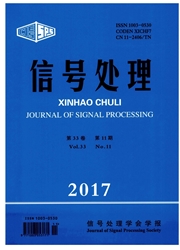

 中文摘要:
中文摘要:
针对OFDMA下行链路系统,在总功率以及用户数据速率成比例的约束下,以获取整个系统容量极大化为准则,提出一种考虑用户优先级的自适应子载波分配算法。该算法初始分配时允许每个用户根据用户数据速率的相对比例以及自己的信道状态在所有子载波上独立的进行最优选择,当出现多个用户同时选择一个子载波,即出现冲突时,由平均信道增益的大小来决定用户选择该子载波的优先级。文中分别研究了平均信道增益大者为高优先级以及平均信道增益小者为高优先级的两种冲突解决办法,仿真结果表明,由平均信道增益小的用户来优先选择冲突子载波的算法综合考虑了公平性和频谱效率,与系统容量上限相比,性能损失较小,复杂度低,速度快,能够满足实时要求。
 英文摘要:
英文摘要:
Orthogonal Frequency Division Multiple Access(OFDMA) is a promising candidate to be used for future cellular systems.A key issue at hand is the rate-adaptive resource allocation problem.In this paper,an adaptive sub-carrier allocation algorithm based on proportional fairness was investigated in the downlink of multi-user OFDM system,which considered allocation of sub-carriers to each user to maximize the sum of user data rate,subject to constraints on total power.Initialization of the allocation was done by assigning the sub-carrier with the highest channel gain to each user independently according to the relative proportion of data rate and the channel state.Conflict problem happened when two or more users chose one same sub-carrier.The priority of user to choose the subcarrier was determined according to the average channel gain.Two conflict resolution algorithms were studied where the lager average channel gain was,the higher one user's priority was or vice versa.Numerical results and comparisons with various conventional adaptive schemes in Rayleigh fading environment are provided to demonstrate the potential of our proposed techniques.It is shown that the proposed sub-carrier allocation algorithm can achieve good tradeoff between fairness and spectrum efficiency as well as provide almost the same capacity gain as the quasi-optimal method.At the same time,our scheme can meet the requirement of real time systems with low complexity and less computation.
 同期刊论文项目
同期刊论文项目
 同项目期刊论文
同项目期刊论文
 Statistical Performance Analysis for MIMO Beamforming and STBC when Co-Channel Interferers Use Arbit
Statistical Performance Analysis for MIMO Beamforming and STBC when Co-Channel Interferers Use Arbit Integer Frequency Offset Estimation for OFDM Systems With Residual Timing Offset Over Frequency Sele
Integer Frequency Offset Estimation for OFDM Systems With Residual Timing Offset Over Frequency Sele A Variable-Population Evolutionary Game Model for Resource Allocation in Cooperative Cognitive Relay
A Variable-Population Evolutionary Game Model for Resource Allocation in Cooperative Cognitive Relay 期刊信息
期刊信息
